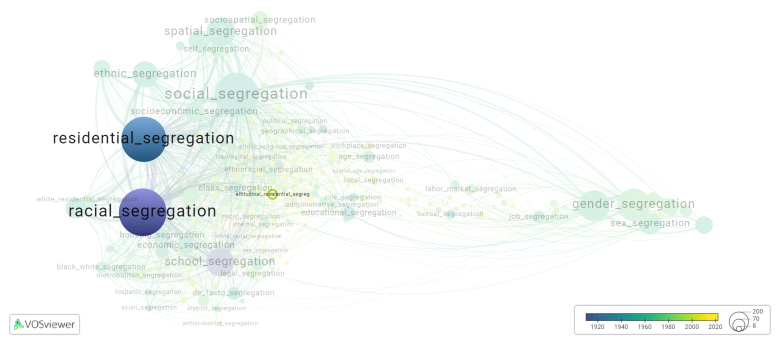Altitudinal residential segregation: Difference between revisions
(Creating page) |
(Creating page) |
||
| (10 intermediate revisions by the same user not shown) | |||
| Line 1: | Line 1: | ||
===== Date and country of first publication<ref>Date and country of first publication as informed by the Scopus database (December 2023).</ref>===== | |||
2006<br> | 2006<br> | ||
United States | |||
===== Definition ===== | |||
Altitudinal residential segregation refers to the phenomenon where different socioeconomic groups or ethnicities tend to live at different elevations within a geographic area. This kind of segregation can occur in mountainous regions, where higher elevations may be associated with higher-income neighborhoods and lower elevations with lower-income neighborhoods. Altitudinal residential segregation can contribute to social and economic inequalities, as people living at different elevations may have unequal access to resources and opportunities. | Altitudinal residential segregation refers to the phenomenon where different socioeconomic groups or ethnicities tend to live at different elevations within a geographic area. This kind of segregation can occur in mountainous regions, where higher elevations may be associated with higher-income neighborhoods and lower elevations with lower-income neighborhoods. Altitudinal residential segregation can contribute to social and economic inequalities, as people living at different elevations may have unequal access to resources and opportunities. | ||
==See also== | ==See also== | ||
==Related segregation forms== | |||
Altitudinal residential segregation is frequently discussed in the literature with the following segregation forms: | |||
[[racial segregation]], [[residential segregation]] | |||
[[File:altitudinal_residential_segregation.png|780x780px]] | |||
This visualization is based on the study [[Segregation_Wiki:About| The Multidisciplinary Landscape of Segregation Research]]. | |||
For the complete network of interrelated segregation forms, please refer to: | |||
* [https://tinyurl.com/2235lkhw First year of publication] | |||
* [https://tinyurl.com/2d8wg5n3 Louvain clusters] | |||
* [https://tinyurl.com/223udk5r Betweenness centrality] | |||
* [https://tinyurl.com/244d8unz Disciplines in which segregation forms first emerged (Scopus database).] | |||
==References== | ==References== | ||
==Notes== | ==Notes== | ||
<references /> | <references /> | ||
== | {{NoteAI}} | ||
==Altitudinal residential segregation appears in the following literature== | |||
Ueland J. | Ueland J., Warf B. (2006). Racialized topographies: Altitude and race in southern cities. ''Geographical Review'', ''96''(1), 50-78. American Geographical Society.https://doi.org/10.1111/j.1931-0846.2006.tb00387.x | ||
Latest revision as of 07:17, 16 October 2024
Date and country of first publication[1][edit | edit source]
2006
United States
Definition[edit | edit source]
Altitudinal residential segregation refers to the phenomenon where different socioeconomic groups or ethnicities tend to live at different elevations within a geographic area. This kind of segregation can occur in mountainous regions, where higher elevations may be associated with higher-income neighborhoods and lower elevations with lower-income neighborhoods. Altitudinal residential segregation can contribute to social and economic inequalities, as people living at different elevations may have unequal access to resources and opportunities.
See also[edit | edit source]
Related segregation forms[edit | edit source]
Altitudinal residential segregation is frequently discussed in the literature with the following segregation forms:
racial segregation, residential segregation

This visualization is based on the study The Multidisciplinary Landscape of Segregation Research.
For the complete network of interrelated segregation forms, please refer to:
References[edit | edit source]
Notes[edit | edit source]
- ↑ Date and country of first publication as informed by the Scopus database (December 2023).
At its current state, this definition has been generated by a Large Language Model (LLM) so far without review by an independent researcher or a member of the curating team of segregation experts that keep the Segregation Wiki online. While we strive for accuracy, we cannot guarantee its reliability, completeness and timeliness. Please use this content with caution and verify information as needed. Also, feel free to improve on the definition as you see fit, including the use of references and other informational resources. We value your input in enhancing the quality and accuracy of the definitions of segregation forms collectively offered in the Segregation Wiki ©.
Altitudinal residential segregation appears in the following literature[edit | edit source]
Ueland J., Warf B. (2006). Racialized topographies: Altitude and race in southern cities. Geographical Review, 96(1), 50-78. American Geographical Society.https://doi.org/10.1111/j.1931-0846.2006.tb00387.x
